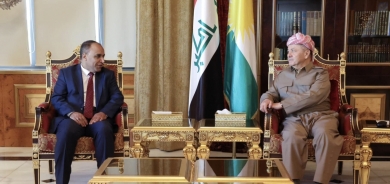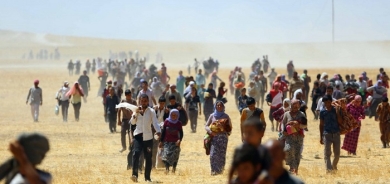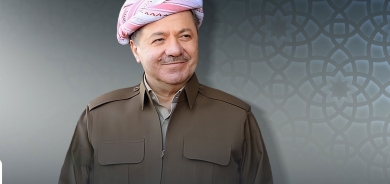Iraqi Elections in Kurdistan

The excuse was the upcoming election. In Suleimani in particular, I saw cars cruising up and down the streets in a traffic jam party of colors and flags. Children were hanging out car and truck windows waving flags, or sitting on the roof of the cars with their flags and noise makers. Other people were shooting fireworks everywhere. There was Kurdish dancing on sidewalks, in the street and across parking lots, and truck drivers were making their big trucks dance by pumping the breaks in time with the music. I sat by the side of the road and petted a baby goat for a while as I watched (I have no idea where the goat came from -- Suleimani is a big city rather than a village). It was all kind of surreal really.
Then suddenly I realized something. Although I saw one Kurdistan Workers’ Party (PKK) flag in the sea of Kurdistan, Kurdistan Democratic Party (KDP), Patriotic Union of Kurdistan (PUK) and Goran flags, there wasn't an Iraqi flag anywhere in sight -- and the whole commotion was ostensibly for the Iraqi nation-wide election. When I mentioned this to one of my friends later, he replied “Did you expect that you will see an Iraqi flag in the Kurds’ hands on the street?”
I thought about it, and concluded that no, I did not expect to see an Iraqi flag in the political parades on Kurdistan’s streets. After a history of repression, arrests, torture, chemical bombardments and the anfal, Iraq is simply not in the Kurds’ hearts. Like a couple that remains married for the sake of the children, south Kurdistanis remain in Iraq for practical reasons rather than emotional ones. During the year I lived in Iraqi Kurdistan (2003-2004), I never met a Kurd who would not ideally prefer to have their own Kurdish state.
The Kurds remain in Iraq because the 2005 Constitution promised them autonomy and decentralization. With these achievements, the risks of secession in such an unfriendly neighborhood seem to outweigh the disappointments of remaining part of Iraq.
Non-Kurdish Iraqis may resent this attitude on the part of the Kurds, but with the least bit of empathy they should be able to understand it. If they want the Kurds to remain part of the country and one day come to really identify with Iraq, they need to build Kurdish confidence and be patient.
Sunnis, Turkmen, Christians, liberals and secular Iraqis in particular also need the Kurds to remain in Iraq if they are to have any chance of balancing against some of the south’s Shiite religious parties and maintaining their own autonomy from Baghdad. Without the Kurds, after every election the likes of Nuri al-Maliki’s State of Law Party could form a majority government with just a few fellow Shiite religious parties. Sunni Arabs in particular are finally beginning to understand that the decentralized federalism they so vehemently criticized when the Constitution was being drawn up was never just for the Kurds. Decentralization, if really respected, an protect people in Anbar, Nineweh, Diyala, Salahadin and even Basra from distant and sometimes unfriendly forces in Baghdad.
Unfortunately and unsurprisingly, the Prime Minister of the last decade has steadily undermined the Constitution and worked to consolidate more power into his office. In doing so, he fragments Iraq further rather than keeping it together. Much of Anbar is already boiling, and festering disputes with the Kurds encourage them to rethink their decision not to risk a state of their own. If the new Iraq was supposed to build the confidence of the Kurds and assuage the fears of the Sunnis, it seems to be increasingly failing the test.
When the votes of this year’s election are finally counted and parties begin working to form a new government, Iraq’s future may well hang in the balance. This may be the last chance for political leaders in Baghdad’s next government to truly respect the Constitution and its provisions for decentralization and power-sharing.

 David Romano
David Romano






